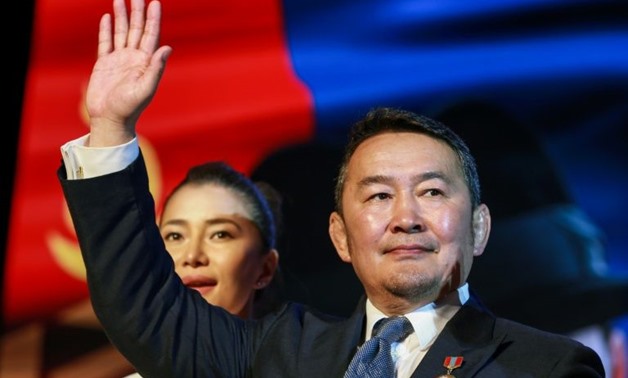
Presidential candidate Khaltmaa Battulga, pictured on June 11, 2017, has been plagued by reports of an offshore account and arrests of many of his colleagues by Mongolia's anti-corruption body - Yahoo News
Ulan Bator - 23 June 2017:Mongolians pick a new president Monday after a campaign marred by corruption scandals plaguing all three candidates, from jobs for cash to offshore accounts and donations from an alleged cult.
The allegations have sapped enthusiasm among voters in a country that remains mired in poverty despite having billions of dollars worth of natural resources buried beneath its sprawling steppes.
"We are forced to choose the lesser of three evils," Dugersurengiin Sukhjargalmaa, a former member of the Mongolia People's Party (MPP) and advisor for national gender justice organisation MONFEMNET, told AFP.
The candidates are Mieygombo Enkhbold for the Mongolian People's Party -- which controls the parliament -- Khaltmaa Battulga for the opposition Democratic Party (DP) and Sainkhuu Ganbaatar for the Mongolian People's Revolutionary Party.
The outgoing president, DP's Tsakhia Elbegdorj, is not running because he has served the maximum two four-year terms.
While Enkhbold is favoured by Mongolia's older stock as the most stable, credentialed choice, his campaign has been plagued by a video recording that allegedly shows the candidate and two MPP officials discussing a $60 billion tugrik ($25 million) plan for selling government positions.
Enkhbold has maintained that the recording was altered to misrepresent the conversation.
Battulga has been haunted by reports of offshore accounts attached to his name, as well as the arrests of several of his associates by Mongolia's anti-corruption body last spring.
The third-party candidate is also not exempt from controversy: a video allegedly shows Ganbaatar receiving a $44,000 donation from a member of the "Moonies," or Unification Church, a South Korean-based Christian group that critics consider a cult.
Mongolian authorities confirmed Thursday that the man in the footage is Ganbaatar, but the candidate has called the clip a ploy by his competitors to force him out of the race.
Battulga has also stirred up controversy by saying that Enkhbold has Chinese ancestry, suggesting he is not pure Mongolian.
Analysts say none of the candidates may win Monday's vote outright, which would trigger the country's first ever run-off election.
"All three of them are knee-deep in scandal," Mogi Badral Bontoi, the head of a Mongolian market analyst firm, told AFP.
"This is probably the most negative elections we've had in 27 years of democratic history."
The scandals have been a distraction as Mongolia grapples with economic problems, with nine percent unemployment a top concern among voters.
The next president will inherit a $5.5 billion bailout package spearheaded by the International Monetary Fund in the hopes of stabilising Mongolia's debt-wracked economy.
The landlocked north Asian nation has been hit hard by a more than 50 percent fall over the past five years in the price of copper, its main export, while slowing growth in its biggest customer China has hobbled the economy.
Mongolia's economy grew a measly one percent in 2016 -- a stark contrast to record-high 17 percent growth in 2011.
Frustrations around the negative campaigns have fuelled speculation that voters will cast an unprecedented number of blank ballots as a protest vote.
At least 50 percent of the voting population must participate for the election to be valid.
Regarded as a democratic oasis sandwiched between Russia and China, the former Soviet satellite once reported around 90 percent voter participation.
But turnout dropped to 64 percent in the last presidential election in 2013.
"I will not cast a vote in this election," said a 37-year-old housewife who gave only her surname, Tuul.
"All three of them are crooks, liars and oligarchs."
Julian Dierkes, a Mongolia scholar at the University of British Columbia, said "nothing really sets the candidates apart".
Instead, Dierkes said, voters may weigh whether to deepen the MPP's dominance or maintaining a balance of powers with the presidency and parliament led by different parties.
At an Ulan Bator supermarket, Amariin Urangoo, a 35-year-old travel advisor, grimaced when asked about the election.
"I won't vote," she said, "because there's nobody to choose from."


Comments
Leave a Comment